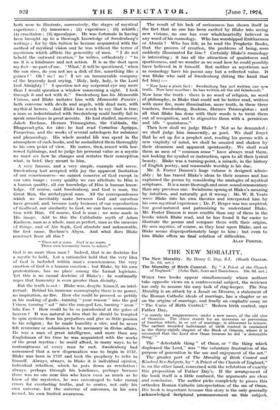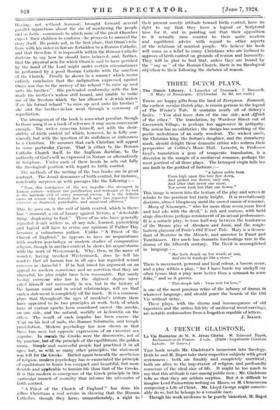THE NEW MORALITY.
The Morality of Birth Control. By " A Priest of the Church of England." (John Bale, Sons and Danielsson. 10s. 6d. net.) WHEN two books appear simultaneously whose authors take opposite views on a controversial subject, the reviewer has only to assume the easy task of ring-keeper. The Ness Morality is an attack by a Jesuit on Divorce, a statement of the Roman Catholic ideals of marriage, has a chapter or so on the origins of marriage, and finally an emphatic essay on " The Curse of Birth Control." Modern birth control, says Father Day, " is merely the reappearance, under a new name, of the old vice of Onanism. The crime stands for an inversion or perversion of function which, in or out of marriage, is abhorrent to science. The earliest recorded indictment of birth control is contained in the thirty-eighth chapter of the Book of Genesis, where it is recounted that the Lord slew Onan because he did ' a detestable The " detestable thing " of Onan, or " the thing which displeased the Lord," was " the voluntary frustration of the purpose of generation in the use and enjoyment of the act."
The greater part of The Morality of Birth Control and Kindred Sex-Subjects, by " A Priest of the Church of England," is, on the other hand, concerned with the refutation of exactly this proposition of Father Day's. If the arrangement of the book itself is a little confused, the arguments are clear and conclusive. The author picks completely to pieces this orthodox Roman Catholic interpretation of the sin of Onan. His book is important because this story is the only generally acknowledged Scriptural pronouncement on this subject. IMma a NW/M.1M.,
Having, not without humour, brought forward several parallel injunctions about the sin of numbering the people and so forth—commands to which none of the great Churches
expect their children to conform—he proceeds.to unravel the story itself. He points out, in the first place, that Onan's rela-
tions with his sister-in-law are forbidden to a Roman Catholic, and that therefore it is impossible within the Roman Catholic doctrine to say how he should have behaved, and, further, that the physical acts for which Onan is said to have perished by the hand of the Lord might under certain circumstances be performed by a good Roman Catholic with the sanction of the Church. Finally he shows in a manner which seems entirely conclusive that the indignation expressed against Onan was due to the secrecy of his refusal " to raise up seed unto his brother." His pretended conformity with the law made his brother's widow still bound, and unable to make use of the freedom which the law allowed a Jewish widow if or, his formal refusal " to raise up seed unto his brother " she and the brother-in-law went through a ceremony of repudiation.
The arrangement of the book is somewhat peculiar, though to those using it as a book of reference it may seem convenient enough. The writer concerns himself, not with the desir- ability of birth control (of which, however, he is fully con-
vinced), but with the question of its sinfulness or sinlessness to a Christian. Ile assumes that each Christian will appeal to some particular Caesar. That is either to the Roman Catholic Church itself, to the Anglican doctrine, to the authority of God's will as expressed i n Nature or alternatively in Scripture. Under each of these heads he sets out fully the theological position with regard to birth control.
The methods -of the writing of the two books are in great contrast. The Jesuit denouncer of birth control, for instance, constantly surprises us with passages like the following :— " Now, this indulgence of the sex impulse—tho strongest in human nature—without the justification and restraint of its end is the intrinsic evil of every venereal excess. It is the definite cause or reason why human law in all ages has regarded these excesses as shameful, punishable, and unnatural offences."
This, he goes on, is the evil of birth control, which is there- fore " immoral, a sin of luxury against Nature, a ' detestable thing,' displeasing to God." Those of us who have generally regarded Jesuit writers as, at any rate, learned, painstaking and logical will have to revise our opinions if Father Day becomes a voluminous author. Unlike " A Priest of the Church of England," he appears to have no acquaintance with modern psychology or modern studies of comparative religion, though in another context he shows his acquaintance with the work of Westermarek. Why, then, in the name of wonder, having invoked Westermarek, does he tell his readers that all human law in all ages has regarded sexual excesses as shameful 2 If he had based his argument on an appeal to modern conscience and an assertion that they are shameful, his plea might have been reasonable. But surely to-day everyone who has in the slightest degree inter- ested himself not necessarily in sex, but in the history of the human mind and in social relationships, will see that such a statement is completely off the mark. It is a common- place that throughout the ages of mankind's history there have appeared to be two principles at work, both of which have at various epochs been considered sacred—the ascetic, on one side, and the natural, worldly or hedonistic on the other. The result of each impulse has been excess—the Yogi on his bed of nails, the Roman Saturnalia, and temple Prostitution. Modern psychology has now shown us that these two were but opposite expressions of an excessive sex impulse. In morals the Greeks were the discoverers, not of the practice, but of the principle of the equilibrium, the golden mean. Simple and successful people had practised it in all ages, but, as with so many other principles, the . statement was left for the Greeks. Buried again beneath the asceticism of religion, modern psychology has re-enunciated the principle of equilibrium in forms less compact and beautiful, but more
flexible and applicable to human life than that of the Greeks. It is this modern re-emergence of the Greek 'principle in this
varticular branch of morality that informs the advocates of birth control.
" A -Priest of the Church of England " has done his fellow Christians a real service in showing that the Roman Catholics. .thouteh they have,• unquestionably, a right to their present ascetic attitude toward birth control, have no right to say that they have a logical or Scriptural base for it, and in pointing out that their opposition to it actually runs counter to their quite modern and equilibrist advice with regard to other aspects of the relations of married people. We believe his book will conic as a relief to many Christians who are inclined to approve of birth control on grounds of reason and humanity. They will be glad to find that, unless they are bound by the " say so of the Roman Church, there is no theological objection to their following the dictates of reason.











































 Previous page
Previous page